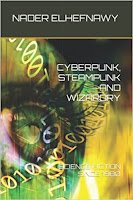I remember being struck by the intensity of the moral panic that surrounded the release of Todd Phillips' The Joker back in October 2019. It had been some time since we last saw anything quite like it--not since the '90s, perhaps, with the panic the more remarkable because, rather than this being a matter of "concerned parents" and the like it seemed to be "liberal" film critics whose duty should ordinarily be a defense of artistic freedom leading the calls for censorship.
The panic has since turned to disdainful dismissal of the panic. This is partly because this is the media's usual way of overcompensating after a more than usually conspicuous display of the extreme stupidity of its personnel. (Consider, for example, how it went from extreme credulousness about self-driving cars being almost here circa 2015 to its present sneering about the prospect of such vehicles ever happening.)
Yet it is also a matter of the film's limitations in handling the issues that it dared to take up (even as its taking them up was clearly the real reason so many critics had it in for the movie). Where those weaknesses were concerned a particularly significant one seemed to be the filmmakers' overreliance on Martin Scorsese's The King of Comedy, and what went with it, its blurring the line between reality and fantasy--leaving at least room for that infamous cop-out, that it was all "just a dream." However, more significant than that was the conception of the character of Arthur Fleck himself--in ways going beyond how the depiction of his mental illness allowed for the possibility. Consider the contrast between what Fleck is, and what the Joker is. In every incarnation of the Joker of which I know the Joker is not merely a murderous criminal, but a criminal "genius." However, Fleck is the opposite, a man who seems a good deal less than mediocre--consistently awkward in manner, inarticulate in speech, foolish in his choices large and small. Of course, people do have their hidden depths, and some rather unprepossessing individuals surprise us with their thoughtfulness, acumen, knowledge and other gifts--in which we may well catch the flash of genius--but I cannot think of any moment in which the film hinted at anything of the kind.
Naturally it is hard to imagine that such a man could ever become the archnemesis of the formidable Batman. And considering that I cannot help suspecting the reason is that this is because Arthur Fleck was imagined as a beaten-down working class man. One might imagine they thought so because of the genuinely smaller opportunities people have in that social strata for acquiring education and culture and developing their abilities and talents than those born in more affluent circumstances, and because it is part of the cruelty of poverty, material security and other such hardships that they are mentally stultifying. Yet even allowing for that unhappy reality something could have been done with the character here. Fleck might have been imagined as one of those poor but bright kids who missed the very limited chance at a better life society offers them; perhaps an avid reader; perhaps simply as one of those unassuming people who now and then manages to say something that catches the people looking down their noses at them off guard and leaves their supposed "betters" spluttering or speechless. However, he wasn't. And it seems to me more plausible that the writers of the movie could not imagine that such a person could be intelligent, articulate, or forceful in any way prior to his deciding that he had nothing left to lose and picking up a gun; that they thought that had he been any of those things he would have somehow ceased to be working class, as if only people who deserve to be "losers" can be found at the bottom.
The result is that, at least on this one point, when taking up subjects very little touched upon by American cinema the filmmakers' work ended up significantly colored by the prevailing prejudices about social class generally, working people particularly--and very likely, the presumption of meritocracy--to its cost.
Book Review: Providence by Max Barry
9 hours ago




